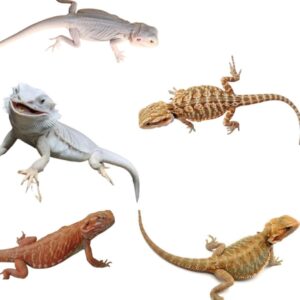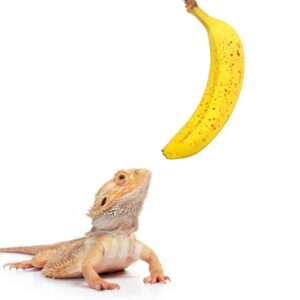Birdies are naturally curious and prefer nibbling on different foods.
But can bearded dragons eat roses?
When offering roses to your bearded dragon, be cautious and consider their safety and nutritional needs.
While roses are not a typical part of a bearded dragon’s diet; if you’re determined to offer them as an occasional treat, read along.
Can Bearded Dragons Eat Roses: Table of Contents
Can Bearded Dragons Eat Roses?
Yes, bearded dragons can eat roses, but with some important considerations. Roses are not toxic to these reptiles. However, roses must be free from pesticides and chemicals, which can harm your pet.
Choose organically grown roses that haven’t been treated with chemicals if you are looking to introduce roses into your bearded dragon’s diet. Remove all thorns and leaves, leaving only the petals.
Even then, moderation is crucial. Occasionally, offer a small amount of rose petals as a supplementary treat rather than a staple food.
Nutritional Value of Roses
Roses are not a primary source of nutrition for bearded dragons. They can provide hydration due to their high water content. While roses contain some vitamins and minerals, they are less nutrient-rich than the staple foods recommended for these reptiles.
The Benefits of Feeding Roses
Here are some potential advantages:
Hydration
The water content in roses can help maintain your dragon’s hydration levels, especially during hot weather.
Enrichment
Introducing new and safe foods like roses can stimulate your pet mentally.
Variety
Adding various foods can prevent dietary boredom and encourage a well-rounded diet.
The Risks to Consider
While roses can be a delightful treat, there are risks associated with offering them to your bearded dragon:
Pesticides
Many store-bought roses are cultivated with pesticides, herbicides, and other chemicals to enhance their appearance and prolong their shelf life.
These chemicals can be harmful to bearded dragons, even in small amounts. Ingesting chemically-treated roses might lead to digestive issues or more severe health problems.
Thorns
Remove thorns from the roses before offering them to your dragon to prevent choking or injury.
Digestive Sensitivity
Some bearded dragons might have digestive sensitivities, so closely observe their reaction when introducing roses.
How to prepare rose petals for bearded dragon
1. Choose Organic Roses:
Make sure to use organic, pesticide-free roses. This ensures that the petals are free from harmful chemicals that could be dangerous for your bearded dragon.
2. Wash Thoroughly:
Gently rinse the rose petals under cool running water to remove dirt, dust, or potential residues. Avoid using soap or any chemicals during the washing process.
3. Remove potential Pesticides:
For extra safety, soak the petals in a bowl and add water with a splash of white vinegar for 5-10 minutes. Rinse the petals thoroughly again after soaking.
4. Remove the Bitter White Base:
At the base of each petal, there’s a white portion that can be bitter and less appealing to your bearded dragon. Trim this white part off, leaving only the colorful petal part.
5. Cut into Bite-Sized Pieces:
Cut the petals into small, manageable pieces. Bearded dragons have small mouths, so cutting the petals into smaller portions makes it easier for them to eat.
6. Offer in Moderation:
Roses can be high in natural sugars, so while they can be a delicious treat for your bearded dragon, they should be given in moderation. Too much sugar can lead to health issues.
7. Observe for Any Reactions:
Introduce the rose petals to your bearded dragon’s diet gradually, especially if they haven’t had them before. Observe your pet for any adverse reactions, changes in behavior, or digestive issues.
8. Rotate Treats:
Variety is important in a bearded dragon’s diet. While rose petals can be a tasty addition, make sure they’re just one part of a balanced diet that includes a variety of insects, vegetables, and appropriate supplements.
Remember, every bearded dragon is unique, so some might enjoy rose petals more than others. Always prioritize your pet’s health and well-being when introducing new foods into their diet. If you need help determining whether a particular food is safe for your bearded dragon, consult a reptile veterinarian.
Vet Q&A
Can bearded dragons eat rose petals?
Yes, bearded dragons can consume rose petals, but ensure they are pesticide-free and thoroughly washed.
Are wild roses safe for bearded dragons?
Yes if they are pesticide-free and sourced from a clean environment.
How often can I feed my bearded dragon roses?
You can feed your bearded dragon rose petals as an occasional treat, once a week or even less frequently. The main portion of their diet should consist of appropriate insects, such as crickets, roaches, and mealworms, as well as a variety of vegetables and leafy greens.
Can rose hips be fed to bearded dragons?
Yes, rose hips are safe and can provide some additional nutrients.
What should I do if my dragon shows adverse reactions after eating roses?
If you notice any signs of illness, such as lethargy or digestive issues, consult a veterinarian experienced in reptile care.
Can bearded dragons eat all types of roses?
Stick to well-known edible rose varieties. Avoid hybrid and ornamental roses.
Alternative Safe Foods
Instead of roses, there are numerous safe and nutritious options you can incorporate into your bearded dragon’s diet to promote their well-being:
1. Leafy Greens:
Leafy greens such as collard greens, kale, and mustard greens are excellent sources of vitamins and minerals. They should constitute a significant portion of your bearded dragon’s diet.
2. Insects:
Insects like crickets, roaches, and mealworms are rich in protein, a vital component of your bearded dragon’s diet. They should be gut-loaded before feeding to ensure optimal nutrition.
3. Vegetables:
Vegetables like bell peppers, squash, and carrots can be offered to your pet in moderation. These provide essential nutrients and hydration.
4. Fruits:
Fruits like blueberries, strawberries, and papaya can be occasional treats due to their natural sugars. Remember, moderation is key.
My Senior Paws is a participant in the Amazon Services LLC Associates Program, an affiliate advertising program designed to provide a means for sites to earn advertising fees by advertising and linking to Amazon.com. We also participate in other affiliate programs which compensate us for referring traffic.




